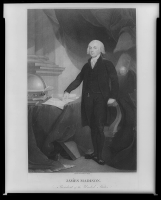Posted on January 30, 2012
That's Why We Have a
Bill of Rights, Dr. Paul
by
Daniel Clark
Do state governments have the right to legalize murder? According to Ron Paul, they do.

During a January 19th debate in Charleston, South Carolina, former senator Rick Santorum charged that Congressman Paul, in spite of his fervent advocacy of the anti-abortion cause, has only about a 50 percent pro-life voting record in Congress. Incredibly, Paul's response was that the slaughter of innocent human beings -- as he unambiguously recognizes abortion to be -- is none of the federal government's business. "All other violence is handled by the states," he said. "That's a state issue."

While it's true that murder and other violent acts are prosecuted at the state level, it does not follow that the states have the authority to legalize them. The Fifth Amendment says, "No person shall … be deprived of life, liberty or property, without due process of law." By taking the position that the systematic killing of millions of innocent people is a state issue, Paul must suppose that the Bill of Rights is a mere suggestion, from which the states may opt out.
If Paul insists on constantly warbling on about the Constitution, he really ought to go back and re-read it. He often cites the Tenth Amendment to support his libertarian philosophy of devolving power to the states, but that is not what it prescribes in all cases. What it says is, "The powers not delegated to the United States by the Constitution, nor prohibited by it to the States, are reserved to the States respectively, or to the people." (emphasis added)

The Fifth Amendment forbids anybody, including the states, from depriving innocent people of life, liberty or property. In fact, the 14th Amendment is partially a reiteration of the Fifth, in that it specifies that "No State" shall deprive people of those same rights. Therefore, the power that Paul says is reserved to the states is instead plainly prohibited to them by the Constitution, which places him as much at odds with the Tenth Amendment as any big-government liberal.
What's really curious is that Paul, who used to be an obstetrician, explains his opposition to abortion through a horrific story about his having witnessed one; yet it's the one offense against the Bill of Rights about which he conspicuously defers to the states. Among the congressman's many -- oh, let's go with "unconventional" -- opinions is that the Civil War could have easily been averted, if only President Lincoln had simply purchased all the slaves from the South and freed them. The reason Abe didn't do this, according to Paul, is that he was bent on instigating the war in for the sole purpose of consolidating power in Washington.
Never mind the flaws in his analysis, which, to put it kindly, are egregious and many. The point is that Paul does not contend that slavery was a state issue about which Lincoln should have done nothing. Instead, he prescribes a heavy-handed, if utterly implausible, course of action by the federal government, at no small taxpayer expense. If he sees a role for the federal government in defending people's right to liberty, then why not life?

Could it be that the man who poses as the consummate non-politician is making the most cynical of political calculations? In open primary states, the bulk of Paul's support comes from voters who are not registered Republican. In fact, his blame-America-first foreign policy and his support for drug legalization have made him a favorite among the loopiest of liberal activists. Hence their gleeful speculation about an independent Ron Paul-Dennis Kucinich ticket in 2008.
Paul has succeeded where countless other politicians have failed in finding a rhetorical middle ground on the abortion issue. From one side of his mouth, he declares that life begins at fertilization, and that Roe v. Wade was wrongly decided. From the other, he assumes the Jimmy Carter "personally opposed, but" position, suggesting that there would be nothing legally wrong with all 50 states allowing the atrocity to continue.
The whole reason we have a Bill of Rights is to establish that our most fundamental, natural rights do not come from man, and therefore cannot be lawfully denied by him. That document is wholly incompatible with the proposition that a state government is free to condone the killing of unborn children within its borders. As long as Dr. Paul refuses to see that, he can be no more consistent a defender of the Constitution than he really is of innocent human life.
The Shinbone: The Frontier of the Free Press
Mailbag . Issue Index . Politimals